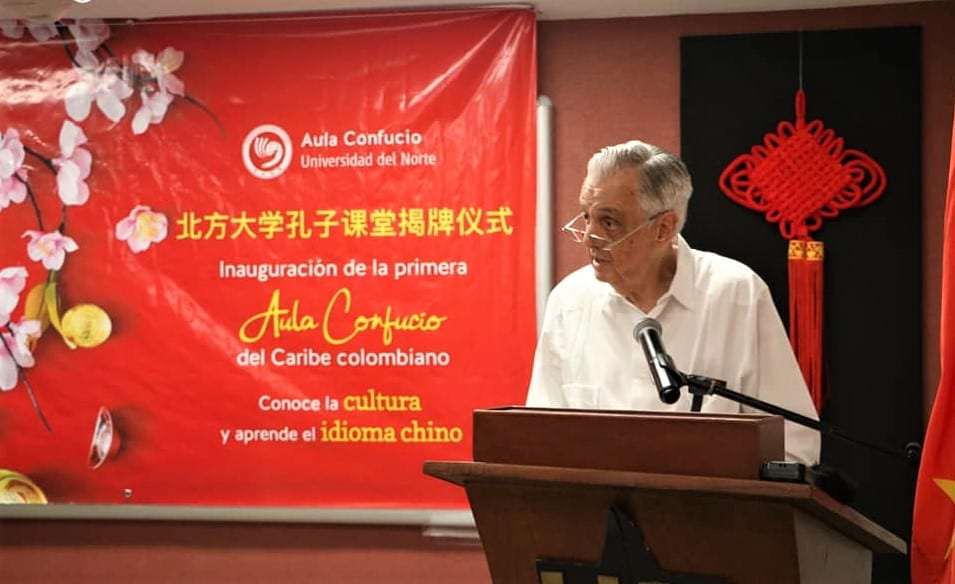
Spanish – The robust economic growth of the People’s Republic of China is undeniable. The international community constantly hopes to strengthen its ties with the Asian giant, whose market comprises more than one billion people, making Mandarin an obligatory language for those seeking to expand and enhance themselves professionally and commercially. However, the desire to participate in this market has made the democracies of the West kneel before a dictatorship in 2020.
While trade unions, business owners, and the academic and political community glorify the economic successes of the Communist Party, they remain silent about the ongoing human rights violations in China. Recently, Senator Marco Rubio has been condemning how the Trump administration’s agreement with China will have a long-term negative socio-economic impact on the United States. Few leaders in the world have been able to advocate for economic prosperity within the framework of respect for freedom and democracy, coupled with sound business practices and innovation. In a column in the New York Times, the senator said that “the agreement involves investments in companies that exist to serve the Chinese Communist Party to undermine the United States, human rights, and religious freedom.” Rubio also points out that “there will be increased U.S. funding for state-owned companies such as the China Shipbuilding Industry Corporation, which produces about 80 percent of the Chinese Navy’s main equipment, and Hikvision, whose products are used by Beijing to monitor the Uighurs” in the concentration camps in Xinjiang.
While the United Kingdom is asking for alternatives to the implementation of 5G technologies by the Chinese company Huawei, the German Minister of the Interior, Horst Seehofer, has stated that Germany needs China to be able to develop this new generation of technology. The European Union is the cradle of some discourse related to safeguarding the environment and is an example of freedom and democracy for many activists who, in turn, wholly incoherently applaud European governments and companies for strengthening ties with the Xi Jinping dictatorship.
Academia is not far behind. China has implemented new programs on the model that Xi Jinping has been leading. This model has intensified nationalism and strengthened political expansion programs with his partner countries. For example, the University of Salamanca in Spain was threatened by the Chinese embassy, demanding the cancellation of cultural activities from Taiwan, which were taking place in October 2017 on the university’s premises. However, the Chinese government’s flagship program is offered by the Confucius Institute, an institution in charge of offering Chinese as a second language program, with local courses and scholarships in China, and with branches in most nations.
While this is not new, since many countries are looking for international students to visit their territories to encourage cultural and commercial exchange, the Confucius Institute adds one ingredient that has set off alarm bells for those who advocate for transparency in academia.
This institute a program of HANBAN, the governmental entity of the Chinese Ministry of Education, in charge of promoting the Chinese language internationally. For more than a decade, it has been subject to reviews and criticism by student and teacher societies and institutions in the United States, Canada, and Europe. As a Chinese state entity, it applies its own rules such as academic control, restricts the freedom of teachers, and has the political objective of promulgating the propaganda of the Chinese Communist Party. For example, Li Changchun, quoted in The Economist, mentioned that the Confucius Institutes are “an important part of China’s overseas propaganda organization.”
There have been many complaints about the recruitment, academic management, and possible interference of the institute in the educational affairs of other countries. Still, there have been notable episodes of censorship in Portugal, where content relating to Taiwan was stolen from material given to students, and the case of a Canadian teacher who was forbidden to freely practice her religious beliefs because they are against the rules of the Chinese Communist Party.
The University of Chicago, Stockholm University, Melbourne University, among others, have abstained or cut ties with the Confucius Institute for infringing on freedom. Publications such as the BBC, Washington Post, and Wall Street Journal have exposed the supposed irregularities at the Confucius Institute, in which academic freedom is violated and where institutions allow HANBAN to interfere in the curriculum. In 2018, Senator Rubio urged Florida’s four universities and colleges to close the Confucius Institutes, citing growing concerns about Chinese influence on foreign academic institutions.
This institution has around 100,000 students and 40 locations in Latin America. In Colombia, for example, its main campuses are in Bogotá and Medellín. The Universities of Los Andes and Jorge Tadeo Lozano in Bogotá and EAFIT in Medellín develop language programs and commercial and cultural expansion together with HANBAN.
In Colombia, Maoism has influenced political and armed movements since the 1960s. Numerous student, union, and academic leaders have mobilized around the ideas of the former Chinese dictator. For example, Enrique Posada, the current director of the Confucius Institute at the Jorge Tadeo Lozano University and a renowned academic, was one of the leading figures who brought the ideas of Mao Tse-tung to Colombia. Having worked directly with the Politburo of the Chinese Communist Party in the 1970s, he served, thanks to Cuba’s political connections with China, as the Spanish translator of the dictator’s writings. Recently, the university EAFIT, along with Pablo Echavarria Toro, the director of the Confucius Institute of Medellin and of Asia-Pacific studies at EAFIT published the text ” Aproximación a China” (Approach to China), which highlights the commercial and cultural advantages with the Asian giant, but completely omits the human rights violations by the dictatorial government of the Communist Party headed by Xi Jinping. The text and other publications by the former ambassador are in line with HANBAN, which urges the strengthening of diplomatic relations with the dictatorship and ignores the historical role of Tibet and the democratic development of Taiwan.
Educational institutions in Colombia, unlike Chinese institutions, enjoy academic freedom. Therefore, even though Enrique Posada’s role in Colombia or Echavarria’s role in the EAFIT at the service of HANBAN lack fundamental ethical principles, it is per the rules accepted by Colombian diplomacy: judge some dictatorships, but embrace others. Let us remember that Colombia has recognized the People’s Republic of China since the Lopez Michelsen Government thanks to the influence of movements such as the Independent and Revolutionary Workers’ Movement (MOIR).
 Versión Español
Versión Español













